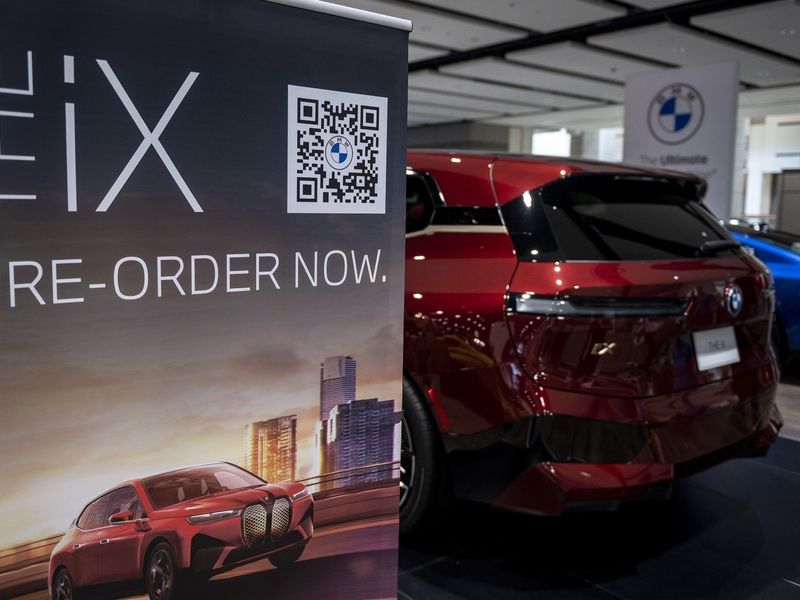
In a year throttled by supply-chain shortages, BMW outmaneuvered rivals Lexus and Mercedes to claim the U.S. luxury sales crown for the third straight year.
BMW appears to have fended off — if only barely — a surging Tesla. The Texas-based EV producer barreled toward 1 million in global sales last year, up 87 percent from 2020.
Overall, the U.S. luxury market outpaced the broader industry last year.
U.S. luxury sales climbed 13 percent in 2021, compared with a 3.3 percent gain for the overall industry. Luxury brands delivered 2.2 million vehicles, accounting for a record 14.7 percent of total U.S. light-vehicle sales.
The BMW brand delivered 336,644 sedans and crossovers in the U.S. last year, on par with pre-pandemic 2019 sales. Robust demand for crossovers fueled the brand’s 21 percent surge last year.
“We had strong end-to-end operational performance — from procurement to sales,” BMW’s global sales chief Pieter Nota told Automotive News earlier this week.
BMW also deftly negotiated the global semiconductor shortage to ensure retailers had product to sell.
“We had the right quantities [of semiconductors] committed early on for 2021,” Nota said. “We have entered into a direct agreement with chipmakers to secure several million semiconductors per year.”
Lexus delivered 304,475 vehicles last year — outselling Mercedes by more than 28,000 vehicles. Lexus’ hybrid sales accelerated 25 percent in 2021.
The chip crisis kneecapped Mercedes-Benz’ luxury volume last year. The automaker delivered 276,102 units in 2021, eking out a 0.4 percent gain from 2020.
It was “just-in-time inventory” for parts of the year, said Jeff Aiosa, owner of Mercedes-Benz of New London in Connecticut.
“Vehicles were delivered almost as quickly as they arrived on the carriers,” Aiosa said. “Floorplan interest was significantly mitigated.”
In a statement Friday, Mercedes said semiconductor supplies remain volatile, with the shortage expected to “impact upcoming quarters in terms of production and sales.”
Audi rounded out the top five U.S. luxury brands in 2021, with 196,038 deliveries, up 5 percent from a year ago.
Alfa Romeo, Cadillac, Infiniti, Jaguar and Lincoln ended the year down, with Infiniti sales sliding the furthest, by 26 percent.
The luxury segment’s old guard now faces a serious threat from Tesla.
According to the Automotive News Research & Data Center, Tesla delivered an estimated 313,400 cars and crossovers in the U.S. last year, up 66 percent from 2020. That would put Tesla in second place for the year. But Tesla doesn’t provide a breakdown by region, making estimates difficult.
However, vehicle registration data — a proxy for sales — paints a worrying picture for the German luxury marques.
Tesla raced past Mercedes-Benz for the No. 3 spot in U.S. luxury-vehicle registrations through the first nine months of 2021, according to data from Experian. Tesla totaled 230,855 vehicle registrations through the first three quarters of 2020, fewer than 29,000 units shy of BMW’s registrations at the time.
Swedish automaker Volvo’s U.S. sales surged 11 percent last year, propelled by demand for electrified vehicles. Volvo delivered 122,173 units in 2020.
Sales of the brand’s Recharge models – vehicles with fully electric or plug-in hybrid powertrains – more than tripled, with 22,820 cars representing 18.7 percent of total U.S. sales.
The chip crisis, notwithstanding, Porsche Cars North America had its best year ever, powered by robust demand for the battery-powered Taycan. The sports car brand delivered 70,025 vehicles — up 22 percent from last year and 14 percent above the previous record set in 2019.
Taycan sales more than doubled last year and nearly overtook Porsche’s flagship 911.